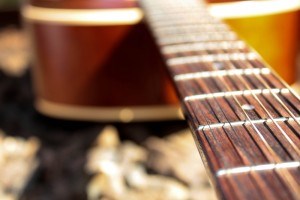For Alpine Summit Seniors Lodge resident Janet Barker, the healing power of music is like no other.

She recently approached the Jasper Rotary Club for a donation to help continue the Evergreens Foundation’s music therapy program.
“It’s a tremendous program—it really helps our residents with Alzheimer’s and dementia,” Barker said. “There’s about 15 patients here with those diseases and a lot of them spend most of the day sitting around in their own little world, but when the music starts you can tell that they are present.”
Sue Cesco, the club’s community committee chair, said the Jasper Rotary Club will donate $1,000 to Jasper’s seniors, securing the music therapy program for another year.
“The community committee has a mandate to try to improve the quality of life in our community and two of the things we really wanted to look at was mental health and community collaborations—those are our big themes this year,” Cesco said. “It was proposed that the music therapy program could use a little help and we thought that really fit with our themes.”
Once a month, accredited music therapist, Cristin Bostrom drives in from Hinton to put on a show for Jasper’s seniors, playing popular tunes from the 1950s and 60s.
“Music therapy often serves as a connector. I introduce various things to think and talk about beyond their own selves. They are connected with the group through music and they start singing and dancing,” Bostom said. “Music therapy can often bring back memories, feelings and thoughts that are sometimes cloudy with dementia.
“It brings these people back into a sense of community that they might not otherwise feel anymore.”
One of the first big things Bostrom notices during a session is that anxieties begin to decrease immediately.
“People who have dementia tend to be confused and sometimes they don’t know why they are in a certain place or what they are supposed to be doing,” Bostrom said. “But once the music starts I notice they are calmer—they are in the moment and forget all the worries they had.”
Following a session, Bostrom said she notices patients begin to revert back to their confused state.
“It’s a very personalized form of therapy,” Bostrom said. “Anytime that people sing together or play music together it automatically brings us all together.”
While Alberta Health Services does have a music therapy program, Bostrom said the therapy isn’t very common yet and struggles to find adequate funding.
“I think as our populations get older more of this type of therapy will be explored and funded—funding is our biggest problem right now,” Bostrom said. “But every year there’s more research being done and more people seeing the benefits of this therapy.”
Cesco is also hoping locals will start to volunteer with the seniors. She encouraged local musicians to drop by seniors homes to play a few tunes.
“It doesn’t have to be a full musical performance. It could just be giving the seniors a few shakers or hosting a simple drum circle,” Cesco said. “We want to see the community get involved on an intergenerational level.”
Kayla Byrne [email protected]
